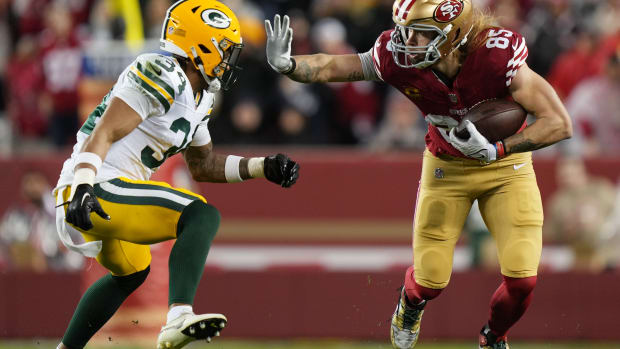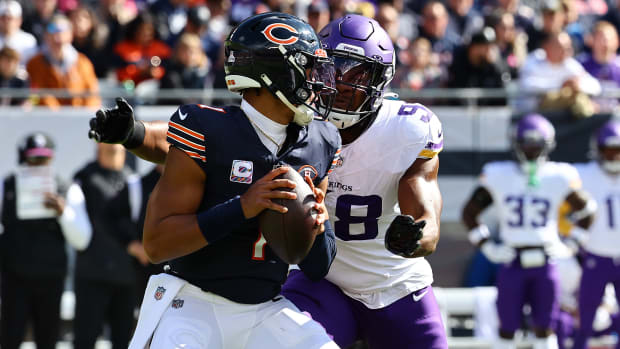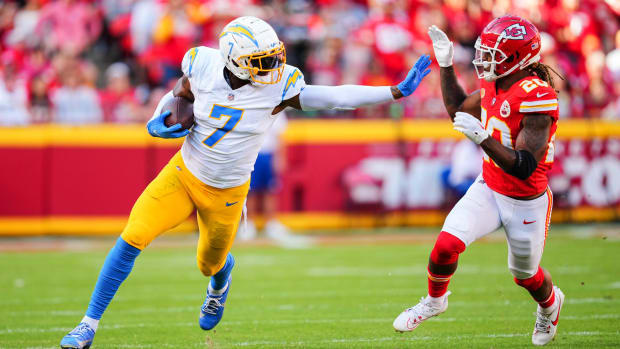Where Bears Are Upgraded and Where They're Not
Offseason personnel moves and the healing effect from the passage of time produce a far different picture for the Bears with training camp three weeks away and counting.
What's often been forgotten about over the offseason was the Bears went 5-3 in the second half and if they'd done it in the season's first half they would have been looking at tiebreakers and a playoff berth. Two of their three losses in the second half came to teams in the NFL's final four.
The team they finished with when the regular season ended looked a great deal different than this one, as GM Ryan Pace tried to mold a better version from the remnants of mediocrity.
For better or worse, these are the areas where change has impacted the team, and their net effect. Not all of them are positive and some were more positive or more negative than others.
The net result is a minor upgrade but whether it's enough to foster playoff hopes—even in a year with more berths available—remains uncertain.
8. Safety Switch: Minor Downgrade
Swapping out Ha Ha Clinton-Dix for Tashaun Gipson might be a major downgrade if the injury troubles Gipson had last year follow him to Chicago. Clinton-Dix did not provide tackling or physicality in any way, and he made it so Eddie Jackson had to be used more as a run stopper than the Bears would like. But what Clinton-Dix did, he did very well. He allowed 59.1% completions when targeted and only a 67 passer rating against. Even his tackling wasn't that bad, at 10.3% missed (9 in 87 tries). Gipson's coverage has always been comparable or even better. He just hasn't been physical. And then there's the injuries last year and trying to pick up a new defense.
7. Depth Defection: Downgrade
When the Bears had Nick Kwiatkoski and Aaron Lynch, they had two defensive replacements who proved effective. Kwiatkoski had been effective enough to be a starter. Lynch at least didn't have a negative effect when he entered games and occasionally made a play. As it turned out, Kevin Pierre-Louis, Cornelius Lucas and Nick Williams were all positive depth players who might have been lightly regarded. Each played a vital role. The replacements for all these players are either from: within the system like linebackers Joel Iyiegbuniwe and Josh Woods; or from outside the team like tackle Jason Spriggs, tight end Demetrius Harris, and edge player Barkevious Mingo; or from college ranks like
6. Guard Grab: Minor Upgrade
Using injured and ineffective Kyle Long, completely inexperienced Rashaad Coward or unhealthy veteran Ted Larsen proved the undoing of their offensive line and a great weight on their running attack. Germain Ifedi may not excite like a first-round draft pick, but he was Seattle's first-round draft pick at one time and he really did appear to be out of position with the Seahawks. It's not certain he'll be any better at guard than at tackle but this has yet to be proven one way or the other. And now at least Coward has some experience.
5. Cornerback Collection: Downgrade
It's true Prince Amukamara didn't have the greatest of seasons in 2019, getting beaten a few times for big plays or touchdowns while putting up a passer rating against of 105.2 one year after he'd been at 75.3. He went without an interception for the second time in three Bears years and had a drop to zero from a career-best three picks. Quarterbacks enjoyed a completion rate when targeting him of 66.2%, almost 9% better than in 2018. Still, he's an experienced, successful defender who really irritated receivers with his ability to stay tight in coverage and use his hands properly for leverage. He also is a good tackler for a cornerback at scant 4.3% and 7% missed tackle rates the last two years. Now he's replaced with a collection of players. If Jaylon Johnson plays in his place, it's a rookie who knows nothing of the NFL and hasn't had offseason practices on the field to bring him up to speed. Veteran Artie Burns as an alternative never had the kind of success Amukamara did even when he was at his best in Pittsburgh, and he just went through successive disastrous seasons. Tre Roberson was chasing after receivers who were NFL castoffs while he was in Canada. And Kevin Toliver was an undrafted free agent who has had two seasons to prepare in Chicago and never made a major step forward. Johnson has time on his side, but for 2020 this can only be viewed as a downgrade.
4. Quarterback Quandary: Minor Upgrade
The quarterback battle pulls in all the publicity but the overall career difference statistically between Nick Foles and Mitchell Trubisky is marginal at best. However, at some specific points in his career Foles was much better. The Bears are basing their faith in him entirely on the premise he is in a familiar offense with familiar coaches and they have recreated the conditions of his great success. Trubisky has had two years in the offense and a step up in Year 3 is always a possibility. The problem is his great weaknesses appear to be the kind a player cannot simply change overnight, if at all. He is not a good passer downfield. This is a tremendous handicap in the NFL. And he has to prove he can read defenses. Having a choice between a struggling downfield passer and a veteran with some past success is still a step up over last year, but not much.
3. Tight End Turnover: Upgrade
Yes Jimmy Graham is older now and looked about as athletic as the Mummy at times last year. He still has sure hands, averaged more yards after the catch than many of the league's best tight ends and his yards averaged per target remains high. With Cole Kmet, anything could happen but usually not much does for rookie tight ends. Demetrius Harris is either a red-zone plus or a dropped pass waiting to happen. Nevertheless, all three are a step up over the collective the Bears threw on the field last year, one with individual highs of 91 yards and 14 catches. If they compared what Graham did to what Trey Burton did in 2018, it would be a minor downgrade. Burton hasn't been that player since the end of the 2018 regular season and banking on his return was a high-end risk, so he's a Colt.
2. Offensive Brain Trust: Upgrade
Everyone liked former offensive line coach Harry Hiestand because he had been part of their Super Bowl run in 2006. Mark Helfrich seemed like an affable guy and he wasn't calling plays. The line didn't seem to block the RPO well and Helfrich was supposed to help with the RPO as someone experienced at it. Both coaches were experienced in RPO in college, where blockers can go 3 yards downfield in an RPO. They weren't experienced at RPO blocking in the NFL, where the zone scheme has to develop within a yard of the scrimmage line. So adding coaches like Juan Castillo and Bill Lazor who have that experience can only help. Adding John DeFilippo as quarterbacks coach after he helped Foles succeeed in the past while in this role is a major plus.
1. Akiem Hicks: Major Upgrade
The decline was sharp and drastic when Hicks essentially left for the season with the elbow injury on the Raiders' first drive in the fifth game.
Sure, he came back and coaches lauded his effort but he even had to come out of that game due to his elbow and then returned. Until Hicks left, the Bears on defense looked no less stubborn or dominant than in 2018—even without all the turnovers. After Hicks left, Khalil Mack became less effective because of double- or triple-teams. The run stuffers became susceptible to cutbacks because Williams, Roy Robertson-Harris and Bilal Nichols just aren't Hicks when it comes to shutting this down.
"You can't replace him on the field," defensive coordinator Chuck Pagano said. "Certainly, we're different when he's out there playing at a high level, than when he's not.
"In the meeting room and around our guys, he's a wise, wise man. He's a smart guy. He gets it. He knows what's going on. When he speaks, people listen. It's like the old EF Hutton commercial—I don't know if anybody even remembers, but you know, he's a smart guy."
Pagano went on to describe Hicks as a "phenomenal human being."
Robert Quinn's addition may not actually be an upgrade because Leonard Floyd did things in the defense Quinn can't do or doesn't do, like play the run, defend pass coverage and supply speed to track down scrambling quarterbacks downfield. Quinn is an asset only at getting a sack. His playing style might actually make the Bears more conventional and less unpredictable.
Hicks returning, even now in his 30s, is a dominant force on the inside and until proven otherwise he elevates the Bears defensively to a different level in much the way Mack does
Twitter: BearDigest@BearsOnMaven




